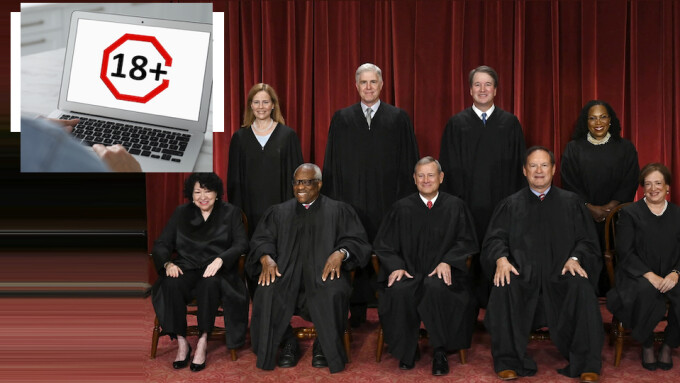WASHINGTON — The United States Supreme Court granted on Tuesday the petition for a writ of certiorari in the Free Speech Coalition-led challenge to Texas’ age verification law, agreeing to hear the case in the next term.
As XBIZ reported, HB 1181 was passed by the Texas legislature in May 2023 and is a much-augmented version of Louisiana’s age verification law and its many copycat versions in other states. At the time, the FSC condemned the law as “blatantly unconstitutional” and a “violation of the First Amendment rights of creators, consumers and platforms.”
In August 2023, FSC filed a legal challenge in Texas over HB 1181, which is still ongoing. Joining the FSC as co-plaintiffs were an array of adult platforms and workers, including MG Premium and MG Freesites, which are now Aylo companies; Webgroup Czech Republic; NKL Associates; Sonesta Technologies; Sonesta Media; Yellow Production; Paper Street Media; Neptune Media; Mediame; Midus Holdings; and Jane Doe, an adult content creator.
The plaintiffs in Free Speech Coalition v. Paxton are represented by the American Civil Liberties Union and the law firm Quinn Emanuel Urquhart & Sullivan.
They argue that Texas’ HB 1181, if left standing, would improperly burden free speech online. The law was authored by Texas Attorney General Ken Paxton’s wife, state Sen. Angela Paxton, reportedly with input from pastor Mike Buster of the Prestonwood Baptist megachurch, to which the Paxtons belong.
In March, the 5th Circuit Court of Appeals partially upheld HB 1181. The Supreme Court has previously rebuked the 5th Circuit Court for eccentric, politicized rulings, most recently last week when ruling against the court’s defense of state interference in social media platforms’ content.
Reactions to SCOTUS' Decision
FSC released a statement Tuesday saying the organization is pleased that the Supreme Court recognized the importance of the issues raised by its Texas challenge and decided to review the case.
“We appreciate the opportunity to make our case before the Court,” FSC noted in the statement.
FSC Executive Director Alison Boden added, “Despite proponents’ claims, online age verification is simply not the same as flashing an ID at a checkout counter. The process is invasive and burdensome, with significant privacy risks for adult consumers. Sexual expression is the canary in the coal mine of free speech, and we look forward to defending the rights of all Americans to access the internet privately and free from surveillance.”
FSC Director of Communication Mike Stabile told XBIZ in April that the HB 1181 ruling by the 5th Circuit was in direct opposition to decades of Supreme Court precedent.
“We remain hopeful that the Supreme Court will reaffirm its lengthy line of cases applying strict scrutiny to content-based restrictions on speech like those in the Texas statute we’ve challenged,” said Stabile. “We will continue to fight for the right to access the internet without intrusive government oversight.”
Vera Eidelman, staff attorney with the ACLU Speech, Privacy and Technology Project said after the ruling, “Though it purportedly seeks to limit minors’ access to online sexual content, the law in fact imposes significant burdens on adults’ access to constitutionally protected expression, requiring them to provide personal identifying information online to access sensitive, intimate content.”
Eidelman added, “This is not the first time that concerns about minors’ access have led legislators to pass unconstitutional laws. We’ve gone through this time and again, with everything from drive-in movies to video games to websites, and courts have repeatedly struck down laws imposing requirements that burden adults’ access to non-obscene sexual content in the name of protecting children.”
The petition was supported by amicus briefs submitted by the International Centre for Missing and Exploited Children; the Foundation for Individual Rights and Expression; the Electronic Frontier Foundation (EFF) and Woodhull Freedom Foundation; and by American Booksellers for Free Expression, the Association of American Publishers, the Authors Guild, the Comic Book Legal Defense Fund and the Freedom to Read Foundation.
The legal team working on the EFF/Woodhull amicus brief included industry attorneys Corey Silverstein and Lawrence Walters.
“We made essential arguments that Woodhull and EFF believed were integral to the Supreme Court ultimately granting this petition and agreeing to take on this case,” Silverstein noted. “Make no mistake about it, this was a massive victory, but the war isn’t over yet, and we are eager to continue advocating for Woodhull and the EFF once briefing begins. Woodhull’s intervention in the case wouldn’t be possible without the financial commitment of MojoHost, which stepped up when the adult industry needed it most.”
Silverstein added that he remains optimistic that the Supreme Court will ultimately strike down HB 1181 “and send a message to all of the states and their lawmakers who decided that they would ignore the First Amendment and existing case precedent in order to push their selfish political aspirations and conservative views.”








